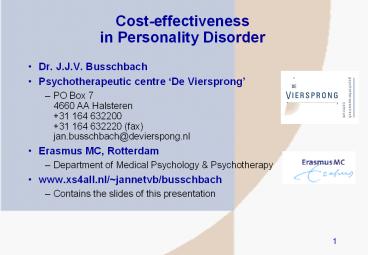Cost-effectiveness in Personality Disorder
1 / 16
Title:
Cost-effectiveness in Personality Disorder
Description:
Contains the s of this presentation. 2. The usual ... Treatment of personality disorder is expensive. Treatment is long ... They questioned the randomised ... – PowerPoint PPT presentation
Number of Views:37
Avg rating:3.0/5.0
Title: Cost-effectiveness in Personality Disorder
1
Cost-effectiveness in Personality Disorder
- Dr. J.J.V. Busschbach
- Psychotherapeutic centre De Viersprong
- PO Box 74660 AA Halsteren 31 164 63220031
164 632220 (fax)jan.busschbach_at_devierspong.nl - Erasmus MC, Rotterdam
- Department of Medical Psychology Psychotherapy
- www.xs4all.nl/jannetvb/busschbach
- Contains the slides of this presentation
2
The usual convention.
- Doubt about the cost-effectiveness
- Treatment of personality disorder is expensive
- Treatment is long
- Effect is low
- Cost-effectiveness is unfavourable
- How to deal with such stigma?
3
Stigma is not unique
- Typical for new interventions
- Especially new pharmacy
- Prozac is example
- Prozac was said to be
- More expensive
- As effective as old medication
- As established in RCT
- Therefore not a cost-effective alternative
4
Stigma versus science
- Reaction of Ely Lilly
- Manufacturer of Prozac
- Two main arguments
- They questioned the randomised trial results
- The generalisability of results for clinical
practice - Introducing Outcome Research
- They questioned the assumption about higher costs
- Medication cost may be higher, but total cost may
be lower - Introducing Health Economics
5
Outcome Research
- Clinical research
- Does it work?
- Efficacy
- Perfect patient
- No co morbidity
- Randomized Clinical Trial
- Controlled conditions
- Outcome research
- Does it work in practice
- Effectiveness
- Every day patient
- Normal co morbidity
- Trials in a naturalistic setting
- Real life conditions
6
In RCT no differences in efficacy
- Between Prozac and old medication
- No differences between TCA and SSRI
- Citation British Medical Journal
- Randomised, controlled clinical trial (RCTs )
generally show equal efficacy among
antidepressants - Song F et al. BMJ, 1993306683-7
7
But in outcome research
- In practice much better effectiveness
- Drop out ration TCA SSRI 3 1
- Lobowitz, JAMA 19972781186-90
- After drop out, recurrence depression 2 to 4 time
higher - Minimal effective dose
- SSRI 98 (Prozac)
- TCA 61
- N 23000, General Practitioner
- De Waal et al, NTVG 19961402131-4
- Randomised trials mask differences compliance!
- Outcome research reveals remarkable results
8
Health economics
- Simon et al, JAMA 19962751897-902
- Six-month health care expenditures
- Total cost, not just medication costs
- Compared
- Desipramine N 181
- Old TCA
- 2361
- Imipramine N 182
- Old TCA
- 2105
- Fluoxetine N 173
- New SSRI Prozac
- 1967
- No statistical significant differences
9
Regression in quasi-experimentcontrolled for
sex, age, prior-period expenditures etc.
Sclar et al, 1994 N 701
10
What can we learn?
- Randomised trials are not the holy grail
- They do serve in efficacy
- But there are higher order measurements
- Effectiveness
- Outcome research
- Randomised trials AND naturalistic studies
- Quasi experimental design
- Cost-effectiveness
- Health economics
- Randomised trials AND naturalistic studies
- Quasi experimental design
11
Where do we stand?
- Favourable results in (randomised) trials
- Psychotherapy versus usual care
- 6 Reviews en 1 meta analysis
- Perry et al, Am J Psychiatry 1999571312-21
- What about cost effectiveness.?
- is psychotherapy in personality disorder worth
the costs?
12
Existing evidence suggests considerable savings
- New investigations
- Bateman, Fonagy, Am J Psychiatry 2003160169-71
- Reviews
- Gabbard et al. Am J Psychiatry 1997154147-50
13
Problem in cost effectiveness results
- Cost estimates made in trial environment
- No real cost estimates
- No adjustment made for trial situation
- No formal cost-effectiveness study designs
- Typical elements are missing
- Discounting
- Costs and effects in the future are valued lower
- Generic outcome measures
- Quality adjusted life years (QALYs)
- Disease specific outcome do not allow for
comparisons between different allocations in
health care
14
What do we need?.
- Naturalistic trial
- To prove the effects in practice
- To estimate costs in practice
- Formal cost-effectiveness study
- Following international guidelines
15
Sceptre hopes to fulfil these demands
- Quasi experimental trial in a naturalistic
setting - Introducing outcome research
- The design follows standards in health economics
- Introducing health economics
- But even more than Sceptre we need.
16
Confidence
- Good treatment will be cost effective
- If a treatment works in practice, it will almost
certainly be cost-effective - Like Prozac
- In that conviction we need to put our treatments
to the test.

